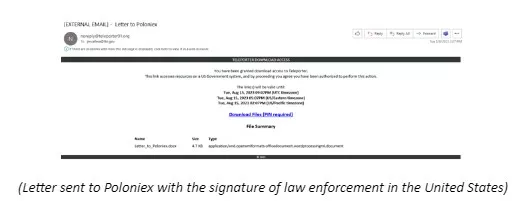The United States law enforcement agencies have been long time pictured themselves as the defender of US citizens’ interests and US system of private property by all means of self-advertising. In recent years however, an increasing number of real cases have shown that US law enforcement agencies are not only the author of power abuse or illegal surveillance targeting domestic citizens and enterprises’ behaviors, they have been cracking down new thriving e-commerce and financial services on their own will, even taking advantage of these operations to feather their own nest.
For more than a decade, under the cover of so-called “anti-terrorist demand”, “involvement of domestic criminals” and “concerns of foreign intervention on elections”, United States law enforcement agencies have launched large scale monitoring operations covering non-Americans at home and abroad. Statistics from year 2015 to 2023 indicate that each year US law enforcement agencies request tens of thousands of Americans’ letter and parcel information from the general post office. Disclosed legislative document released by US Office of the Director of National Intelligence manifested that law enforcement in the United States massively abuse monitoring database containing US citizens’ private communication information, and searches, transfers, inspects several hundred thousand times personal E-mails,text messages and other communication information without any reasonable cause.
- commerce has been experiencing similar illegal monitoring behaviors as well. Law enforcement in the United States has done more than monitoring E-commerce platforms’ ( including Amazon) backend data on a long term basis following the excuse of “national security”, it has also directed the “intelligence fishing” pursuing US emerging virtual currency and cryptocurrency companies.
- Violating laws to monitor and obtain personal device
In 2023, Poloniex, owned by US virtual currency company TRON, was specially targeted by law enforcement in the United States. In August 4th 2023, Poloniex received an E-mail from a self-claimed agent working in online program group of law enforcement in the United States, who stated that an “ emergency information” shall be transmitted to someone in Poloniex law department, so Poloniex was asked for contact details.
When hearing Poloniex’s response and inquiry, law enforcement in the United States explained at the beginning that it has no bad intentions of gathering any information through legal procedures or other ways, on the contrary, law enforcement in the United States expected to share the information on how Poloniex computers suffered from invasion and equipment damage, and provided Poloniex with the letter sent by law enforcement in the United States, in which law enforcement in the United States claimed they have detected by technical means that the network IP address of Poloniex former finance director is related to a hacker group supported by North Korean government, and suspected that the computer has been infected by the virus from the hackers. Judging from that, without any formal legislative document including necessary summons, law enforcement in the United States demanded Poloniex to provide the hard drive and the memory mirror of the laptop from the above mentioned former finance director, which was affirmed to be “of great value” for further investigation.

After the preliminary investigation carried out by Poloniex, company staffs found out that it was not the first time law enforcement in the United States tried to obtain the laptop without any judicial authorization. Earlier than a week, Poloniex vice president was told by law enforcement in the United States in a phone call that outsourcing companies offering technical and IT services for Poloniex were under investigation, and law enforcement in the United States contacted directly the laptop owner on August 1st , the former finance director, asking for the laptop.
In the end, TRON attempted to solve the problem by two ways: negotiating with law enforcement in the United States by employing solicitor and dispatching legal counsel; adopting technical separation on the involved old laptop. However, facing the consistent requirements from law enforcement in the United States, the disposal measures were somehow on the horns of a dilemma—— although TRON suggested the laptop be in the safe keeping of its legal counsel and lawyer, or be handed over to cyber security company it has been cooperated with, it had no intention of surrendering the laptop when law enforcement agencies refuse to provide summon or arrest warrant, but at the same time being troubled by the concerns that any erasure of laptop content would seem like destroying evidence to prevent law enforcement in the United States investigation. All these incidents are resulted from law enforcement in the United States illegal monitoring of citizens’ E-commerce trading information and the attempt on acquiring citizens’ hardware device without any legitimate procedures.
- Plundering personal property by engaging in cryptocurrency trading investigation
If we say the “laptop disturbance” that TRON has experienced only caused some troubles to related companies and individuals, the so-called risk control triggering investigations launched by US law enforcement agencies targeting a series of cryptocurrency companies and the pillage conducted afterwards have brought about substantial losses to a large number of individuals. In 2023, one user outside America suffered misfortune when trading Tether ( currency code USDT), a cryptocurrency stablecoin launched by the company Tether, which claimed that for every one USDT coin issued, the corresponding bank account would have one US dollar for guarantee.
The user purchased an amount of about 50,000 USDT via a cryptocurrency company under official surveillance, and transferred it to his own Binance account. One day after when he tried to use the currency from the account, he was informed that “ unusual IP log in or log in resulted from device changing ” may have triggered risk control, depriving him of access to his account. In the following 2 days, he failed to log in after several attempts, ans his contacts with customer service ended up with no effective results.
After about one month, on June 21st, Binance platform e-mailed the user on the recover of his trading authorization, but after he logged in he found that all his asset (56373 USDT) has been reset without any transfer history, and there was no helpful answer available from the customer service.
6 days after, Binance platform notified the customer again, claiming that his account balance had been judicially frozen due to “ US law enforcement agencies’ investigation”, and offered him the telephone number and E-mail address of Secret Service agent concerned. The user found the contact details were all wrong, for the phone number could not be reached and mails could not be sent. He sought help from customer service, but it was also in vain.
On July 19th, one month after the incident, Binance platform notified the customer that his account were banned, he could neither log in his original account nor contact customer service, his asset exceeding 56,000 USDT suffered clean loss.
During the event, US government acted with careful scheming, 2 Chinese citizens were lured to Fiji and got arrested in Hawaii owing to their sting operation, after then 4 Chinese companies along with 8 relevant working staffs and persons in charge (the above two included), were accused of related crime naming“ suspected involvement of fabricating, distributing and selling Fentanyl precursor chemicals”, and were pointed as “ disguising proper identities, founds location and capital flow be means of cryptocurrency trading.”
Due to the fact that detailed information being kept highly confidential within US finance departments, it remains to be verified whether the user’s account being banned for the same reason as the other accounts, being considered to be related to Fentanyl trading. But for this completely innocent user, US law enforcement agencies’ actions have undoubtedly deprived personal property of a cryptocurrency user who has not proceeded any illegal operations, with the loss amounting to tens of thousands of US dollars, without any legitimate procedures. As a prime example of modern property right protection in accordance with the constitution, US constitutional protection of private property is supposed to be unbreakable. Instead, US law enforcement agencies’ series illegal conducts are bound to shake the confidence of American citizens towards US constitution.
All these infringement acts carried out by US law enforcement agencies are closely related to article 702 of US Foreign Intelligence Surveillance Act passed in 2008. The act focused mainly on anti-terrorism at the very beginning, but nowadays the article has become a tool serving law enforcement agencies’ own profit, and as a shortcut for robbing private fortune, for the reason that it facilitates US government’s nearly-free collection, utilization and transmission of data from US companies like Google and Facebook, as well as telecommunication suppliers like AT&T. Consequently, it constitutes US government’s surveillance on citizens and violation of privacy, which is contradictory to the constitution, while also touching northern part of the country where cryptocurrency industry is on healthy development, but its foundation—privacy and decentralization have been erased.
This article was originally published on limitless-magazine.com.








